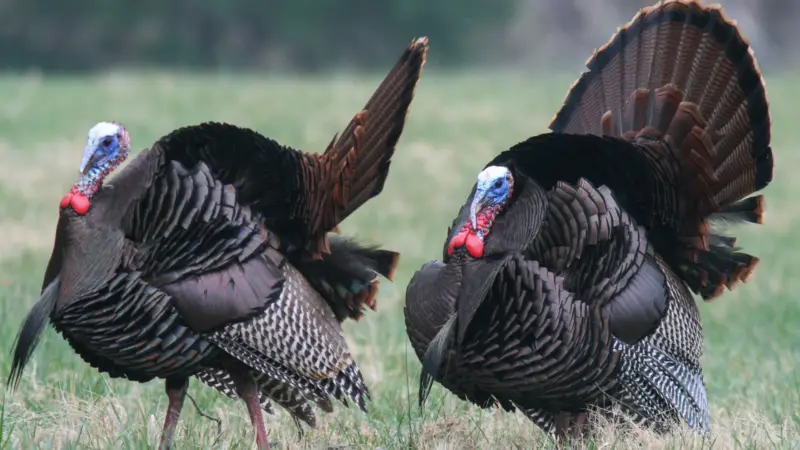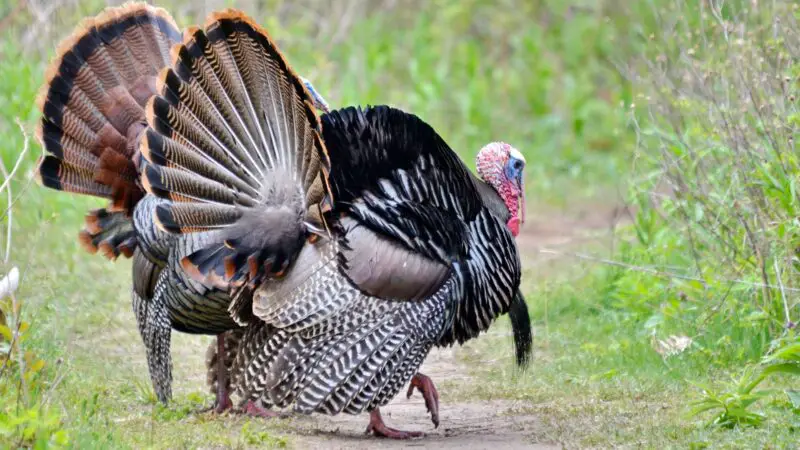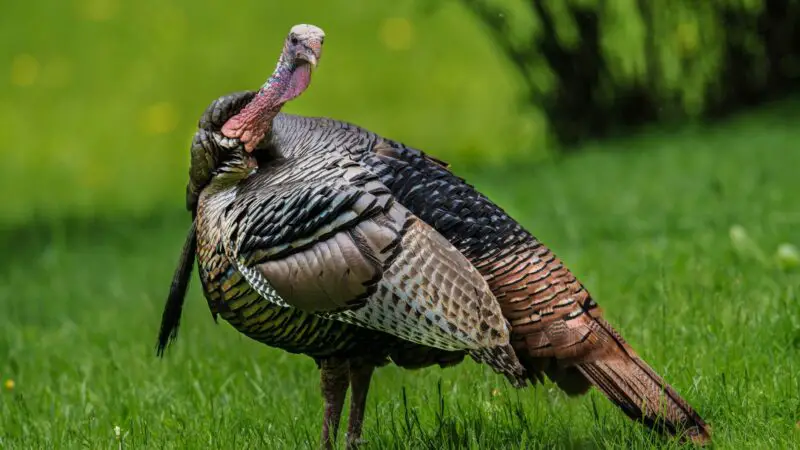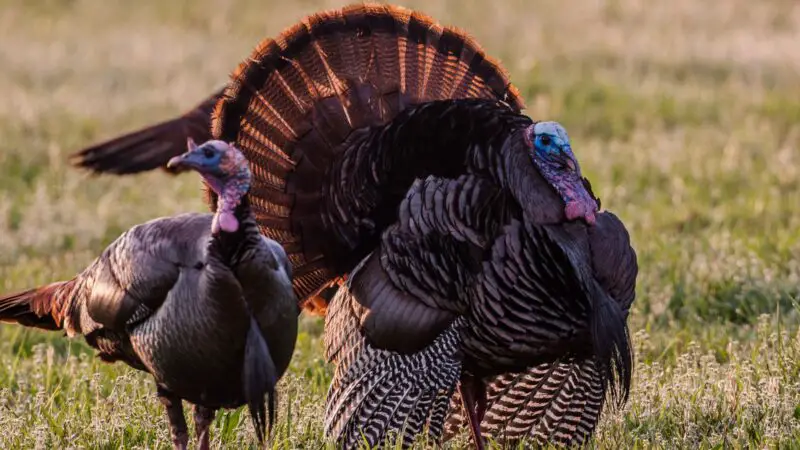Raising turkeys can be a rewarding experience, but it also comes with its own set of challenges. In general, turkeys are harder to raise than chickens because they are more prone to disease and require a more specialized diet. However, with proper care and attention, raising turkeys can be a fulfilling venture for those looking to diversify their poultry farm or start a new business.
Are you thinking of raising turkeys? Whether you’re a first-time farmer or an experienced poultry raiser, this article will provide you with valuable insights on how to raise turkeys, including their pros and cons, the easiest turkey breeds to raise, how long to raise them, how to raise baby turkeys, and much more. Keep reading to learn more about this exciting and rewarding venture!

Are Turkeys Hard to Keep?
Compared to chickens, turkeys are harder to keep because they require more specialized care and have a higher susceptibility to diseases. Turkeys are more prone to respiratory problems and require a specialized diet that includes higher protein content. They are also more sensitive to temperature changes and require proper ventilation to avoid heat stress. However, with proper care and attention, raising turkeys can be an enjoyable and fulfilling experience.
What Is the Easiest Turkey to Raise?
The easiest turkey breed to raise is the Broad Breasted White, which is a popular commercial turkey breed due to its large size and fast growth rate. They are easy to care for and have a calm temperament, making them a great option for first-time turkey raisers. However, they are not the best option for those looking to breed their turkeys, as they have been selectively bred for meat production and may have fertility problems.
How Long to Raise a Turkey?

Turkeys take longer to reach maturity than chickens, and the length of time required to raise a turkey will depend on the breed and the purpose for which it is being raised. Commercial turkeys can be raised to market weight in as little as 14 weeks, while heritage breeds may take up to 28 weeks. If you are raising turkeys for breeding purposes, it is important to allow them to mature fully before breeding.
Will Free-Range Turkeys Fly Away?
Turkeys have the ability to fly short distances, but whether or not they will fly away depends on a variety of factors, including their breed, the availability of food and shelter, and the presence of predators. Some turkey breeds, such as the Broad Breasted White, are less likely to fly away due to their large size and heavy build. However, all turkeys require proper fencing and shelter to protect them from predators and keep them from wandering too far.
How to Raise Turkeys?

Raising turkeys requires a different approach than raising chickens, and there are several factors to consider.
- First, you’ll need to choose the right breed for your purposes.
- Then, you’ll need to provide them with proper housing, food, and water.
- Turkeys require more space than chickens and a specialized diet that includes higher protein content.
- You’ll also need to monitor them for signs of disease and provide proper ventilation to avoid heat stress.
How to Raise Baby Turkeys?
Raising baby turkeys, also known as poults, requires special care and attention to ensure their health and well-being. You’ll need to provide them with a warm, dry environment and proper nutrition, including a high-protein starter feed. Poults require more frequent feeding and watering than adult turkeys and are more susceptible to disease, so it is important to monitor them closely and provide proper veterinary care as needed.
Can You Raise Turkeys With Chickens?
It is possible to raise turkeys with chickens, but it is important to keep a few things in mind. Turkeys and chickens have different dietary requirements, so you’ll need to ensure that both groups are receiving the proper nutrition. Additionally, turkeys are more susceptible to disease than chickens. It’s important to separate sick birds from the rest of the flock and practice good biosecurity measures. Finally, turkeys and chickens have different temperaments and social hierarchies, so it’s important to monitor their interactions and provide enough space to avoid overcrowding and aggression.
How to Raise Turkey for Eggs?
Turkeys can be raised for their eggs, which are larger than chicken eggs and have a unique flavor. If you’re interested in raising turkeys for their eggs, you’ll need to choose a breed that is known for its egg-laying ability, such as the Bourbon Red or the Royal Palm. You’ll also need to provide them with proper nutrition, housing, and veterinary care to ensure their health and well-being. Remember to collect their eggs frequently and store them properly to maintain their freshness.
Related Questions

How to Raise Eastern Wild Turkeys?
Raising Eastern wild turkeys requires a different approach than raising domesticated turkeys. If you’re interested in raising Eastern wild turkeys, you’ll need to obtain a permit and follow regulations set forth by your state wildlife agency. Eastern wild turkeys require a large, forested habitat with access to food and water sources. It’s also important to monitor them for signs of disease and predation and provide appropriate veterinary care as needed.
How Big Do Eastern Wild Turkeys Get?
Eastern wild turkeys are smaller than domesticated turkeys, with adult males (also known as toms) weighing between 16 and 22 pounds and adult females (also known as hens) weighing between 8 and 12 pounds. They have a distinctive feather pattern that includes iridescent feathers on their tail and wings and a bare, red head.
How Long Do Turkeys Live?
The lifespan of a turkey will depend on its breed and the conditions under which it is raised. Domesticated turkeys are typically raised for meat and are usually processed before they reach maturity. Heritage turkeys, on the other hand, can live up to 8 or 9 years if they are well-cared for. Eastern wild turkeys can live up to 3 to 4 years in the wild. However, their lifespan can be significantly shorter if they are raised in captivity.
Final Thoughts
Raising turkeys can be a rewarding and fulfilling experience, but it also comes with its own set of challenges. Turkeys are more susceptible to disease and require a specialized diet and housing. However, with proper care and attention, turkeys can thrive and provide a valuable source of meat, eggs, and companionship. Whether you’re a first-time turkey raiser or an experienced poultry farmer, always remember to prioritize the health and well-being of your birds and provide them with the best care possible.
Related: Best Housing for Turkeys | What Type of Housing Do Turkeys Need?
List of Sources
Raising Turkeys | Animal & Food Sciences
